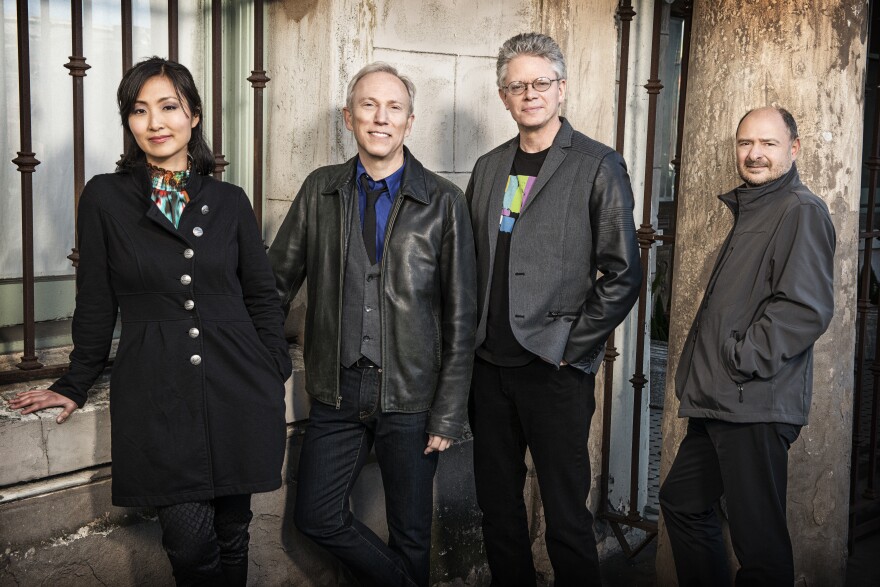Kronos helped turn the string quartet into a global art form
The Kronos Quartet has been performing for more than 40 years. The group has commissioned more than 900 original pieces from composers who include Terry Riley and Philip Glass, and have even played with rock stars such as Bowie and McCartney. They’ve also helped turn the string quartet into a global art form.
Tiny Desk
Seeing Kronos in concert is like seeing the Beatles or U2 of the classical world. Well ... it’s a little more subdued. A recent concert at the L.A. County Museum of Art’s Bing Theater attracted a fairly genteel crowd, with plenty of gray hair in the audience — although there was a nice mix of men and women, different races, and even some kids. But is there such a thing as a Kronos-head? Wayne Lecheminant from Glendale might qualify:
“The first recording I heard is Philip Glass’ Mishima String Quartets [from 1985]. And I listened to it constantly, probably for — without exaggeration, for probably six months, every day.
The Kronos Quartet is violinists David Harrington and John Sherba, violist Hank Dutt and cellist Sunny Yang.
Meet Kronos Quartet
Asked which Beatle each one is, Harrington laughed: “You know, the Beatles were such a great quartet, and part of the greatness was they each contributed something that the others didn’t have.”
The Butcher's Boy
The story of Kronos began when Harrington was 12-years-old, living in Seattle. He sent away for a recording of Beethoven’s Opus 127 string quartet after reading about it in a biography. Harrington recalls:
I kept putting it on and putting it on because the opening chords just did something to me. And I was playing in the Seattle Youth Symphony at the time. I called up another violinist, a violist, and a cellist — and I went down to the Seattle Public Library and checked out the music to Beethoven’s Opus 127. And a couple days later, we were playing it.
Some 10 or 11 years later, on the radio was the first recording ever made of ‘Black Angels’ by George Crumb. I realized, in order to play that music, I was going to have to get a group together that was really serious about itself, and would want to rehearse and spend a lot of time. And so that’s how Kronos started. And our first concert was in November of 1973.
My wife, Regan, came to that concert. She said, "How come there weren’t any women composers?" And it was like cold water in the face or something, because I didn’t know one single woman composer. And it’s taken many, many years, but at this moment right now, I can tell you that there are as many wonderful female composers writing for Kronos as male composers.
At the LACMA concert, Kronos performed a new piece, “Yessori (Sound from the Past),” by Korean composer Soo Yeon Lyuh. She joined the quartet on stage with her haegeum, a Korean two-string fiddle. It’s one of the 50 pieces Kronos has commissioned in its new "Fifty for the Future" initiative. Harrington explains:
"Fifty for the Future" is our attempt to hand the essence of our work to other groups, other musicians. Right now, you can go onto our website and you can download the scores and the parts, recordings, information about the music, interviews with the composers — music from Mali in Africa, from India, from China. We’re hoping that by the time all 50 pieces — 25 women composers, 25 men composers — when they’re all done, there will be this portrait, not only of Kronos, but kind of of the time that we’re all sharing right now.
Bands break up all the time. Harrington said he came close to walking away back in 2003, when the invasion of Iraq, combined with the birth of his granddaughter, made him question the value of what he was doing. Harrington remembers a conversation with the late historian Howard Zinn that turned things around:
One of the things he said is, Powerful people are actually afraid of artists. They’re afraid of music. Because it can change the way you see things, the way you feel about other people, the way you feel about life, and languages and religions and cultures.”
Harrington noted that the string quartet has become a worldwide language. “And if Kronos has had anything to do with that,” he said, “I’m incredibly proud.”



